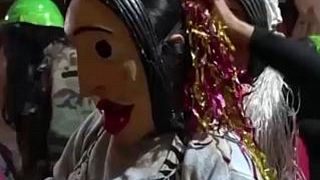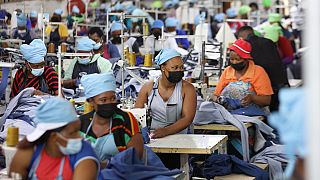Lesotho
Jockeys from isolated corners of the southern African kingdom of Lesotho rode their mounts to the mountain village of Semonkong on Saturday, eager to compete.
Horse racing is a century-old tradition and a major social occasion in the impoverished nation of about 2 million people.
"I can go fast, very fast," 17-year-old Tsaeng Masotsa says defiantly before heading to the starting line.
At more than 2,200 meters above sea level, the high plateaus of Semonkong, in the centre of the landlocked country, play host to a renowned racetrack.
Covid period aside, races are held here throughout the dry season, from May to September, up to the beginning of winter, with the most prestigious day marking King Letsi III's birthday in July.
Today a few hundred people, most wrapped in bright traditional shepherd's blankets, have gathered to watch dozens of riders square off under the pale sun.
"The news spread like wildfire from village to village," says Jonathan Halse 52, who runs a lodge in the area and is among the race's sponsors.
Many things are still organised by word of mouth here.
- Ponies and gambling -
The horse came to Lesotho with European settlers in the 19th century.
The local pride, the "Basuto pony", is the result of crossbreeding over time.
Despite their name, the ponies are of medium size and known for their endurance.
Locals still use them to herd sheep and goats or for everyday transport. Some villages are accessible only on horseback.
"It's an absolute necessity in everyday life. There are places where you can't go otherwise," says Motlatsi Manaka, a 45-year-old herder.
At the racetrack, the animals are brushed, their manes braided or trimmed.
They have undergone months, or sometimes years of training to be here.
In what is one of the poorest countries in the world, horse races are a good source of income for breeders.
Winning prizes can reach $130 dollars -- about the same amount as the average monthly salary in the country.
Gambling is also rife.
Bundles of money are passed among spectators seated on large stones.
Most horse owners are shepherds who make living selling wool.
The annual shearing season has just begun.
At a barn a few miles away, wool is sorted on wire-mesh tables, depending on length and thickness.
Shepherds receive about $3 dollars per kilogramme of fibre.
Jockeys get just a little more to ride. Most are boys under 20.
The race is divided into several events, based on the age of the horses taking part.
"My horse will be victorious, no adversary can resist him," some riders chant, before launching their horses at breakneck speed on the curved course.
The dirt track, about one kilometre long, is enveloped in mist from the nearby Maletsunyane Falls, among the largest in Africa.
The riders whip and some slap their horse on the neck. The finish line is marked by a pile of stones.













Go to video
Prince Harry accused of orchestrating a bullying and harassment campaign
01:26
UN: Southern Africa faces worst hunger crisis in decades due to El Niño
01:38
Noor Slaoui on Olympics pride and charlotte Dujardin controversy
01:03
Lesotho's Prime Minister Faces Uncertainty Amid Constitutional Challenge
Go to video
Lesotho: meet the first chef to have documented Basotho cuisine
01:10
Lesotho's new millionaire prime minister takes office